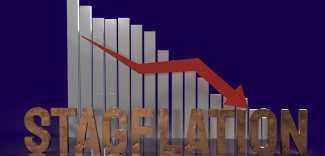
What Is Stagflation and Should You Be Worried?
A term we’ve heard a lot as it pertains to the U.S. economy is stagflation. This is a term we haven’t heard since the 1970s, for those who can remember back that far. So, what is stagflation? When you Google the definition, it states stagflation is “Sluggish economic growth coupled with a high rate of inflation and unemployment.”
Historically speaking, this is what we saw in the 70s. Persistent or higher than normal inflation combined with declining growth (recession), high oil prices, and unemployment. At that time, inflation seemed to feed on itself, and people bought more goods in anticipation of rising prices. Prices were driven higher by increased demand for goods and higher wages. It was an upward spiral.
With all the chatter about stagflation, we wanted to answer a few common questions we’re getting at Oakwood Financial Group.
Why is this a big deal?
With persistent high inflation, things get more expensive, and if we have slowing growth on top of that, it generally means the economy is weaker. It’s harder for the economy to combat higher inflation when those things are the case. Quite often, this also means higher unemployment.
Are we in the space of stagflation, or is it a risk?
It’s always a risk. At this point, we don’t see it as a huge probability based on where we are as of the writing of this blog. While we have rising inflation and interest rates, at this point, we don’t have rising unemployment. All those elements factor into the stagflation algorithm.
If we get to a space where employers feel the pinch of inflation with consistency and they need to slow down hiring, we may see stagflation come into play. In this season of higher inflation, it’s something to keep on your radar.
What does stagflation mean for me?
Everyone is in a different space financially. While stagflation is undoubtedly something to consider, don’t make any snap decisions about your future right now based on today’s noise. We’re not there yet. If it comes to fruition, stagflation means higher prices and a slower economy for all of us, but there can be opportunities when it comes to your financial portfolio.
If you have questions about your financial space and how stagflation might affect you, call us at (412) 928-8801 or visit us at www.oakwoodfinancialgroup.com. We’re always happy to discuss stagflation, your financial goals and answer your questions.
These Blogs are provided for informational purposes only and should not be construed as investment advice. Any opinions or forecasts contained herein reflect the subjective judgments and assumptions of the authors only and do not necessarily reflect the views of SagePoint Financial.

